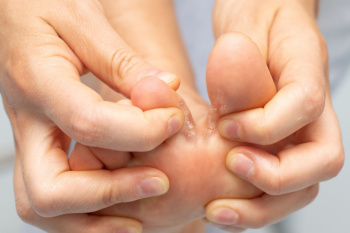
Athlete's foot, or tinea pedis, is a fungal infection caused by the same dermatophytes responsible for ringworm and jock itch. It typically affects the skin between the toes. Athlete’s foot thrives in warm, humid environments, making it common among athletes and people who use shared facilities like gyms and pools. Moist socks and shoes can encourage the growth of these fungi. Symptoms often include itching, burning, redness and peeling skin, especially between the toes, and in some cases, blisters may form. While antifungal creams can be effective, persistent or severe symptoms may need medical attention. If you experience intense pain, swelling, or signs of a secondary bacterial infection, such as increased redness or discharge, it is suggested that you schedule an appointment with a podiatrist. They can provide an accurate diagnosis and personalized treatment options.
Athlete’s Foot
Athlete’s foot is often an uncomfortable condition to experience. Thankfully, podiatrists specialize in treating athlete’s foot and offer the best treatment options. If you have any questions about athlete’s foot, consult with Raul Hidalgo DPM from South Texas Foot & Ankle Care. Our doctor will assess your condition and provide you with quality treatment.
What Is Athlete’s Foot?
Tinea pedis, more commonly known as athlete’s foot, is a non-serious and common fungal infection of the foot. Athlete’s foot is contagious and can be contracted by touching someone who has it or infected surfaces. The most common places contaminated by it are public showers, locker rooms, and swimming pools. Once contracted, it grows on feet that are left inside moist, dark, and warm shoes and socks.
Prevention
The most effective ways to prevent athlete’s foot include:
- Thoroughly washing and drying feet
- Avoid going barefoot in locker rooms and public showers
- Using shower shoes in public showers
- Wearing socks that allow the feet to breathe
- Changing socks and shoes frequently if you sweat a lot
Symptoms
Athlete’s foot initially occurs as a rash between the toes. However, if left undiagnosed, it can spread to the sides and bottom of the feet, toenails, and if touched by hand, the hands themselves. Symptoms include:
- Redness
- Burning
- Itching
- Scaly and peeling skin
Diagnosis and Treatment
Diagnosis is quick and easy. Skin samples will be taken and either viewed under a microscope or sent to a lab for testing. Sometimes, a podiatrist can diagnose it based on simply looking at it. Once confirmed, treatment options include oral and topical antifungal medications.
If you have any questions, please feel free to contact our office located in San Antonio, TX . We offer the newest diagnostic and treatment technologies for all your foot care needs.
